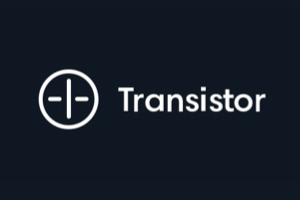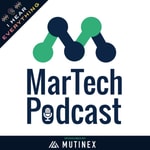Voice Tech Podcast: Master AI for B2B Audio Content Marketing in 2025 – Détails, épisodes et analyse
Détails du podcast
Informations techniques et générales issues du flux RSS du podcast.

Voice Tech Podcast: Master AI for B2B Audio Content Marketing in 2025
Carl Robinson
Fréquence : 1 épisode/14j. Total Éps: 86

Classements récents
Dernières positions dans les classements Apple Podcasts et Spotify.
Apple Podcasts
🇨🇦 Canada - marketing
02/01/2025#95🇨🇦 Canada - marketing
01/01/2025#60
Spotify
Aucun classement récent disponible
Liens partagés entre épisodes et podcasts
Liens présents dans les descriptions d'épisodes et autres podcasts les utilisant également.
See all- https://zoom.us/
664 partages
- https://zoom.us
179 partages
- https://aws.amazon.com/
123 partages
- https://aws.amazon.com/polly/
78 partages
- https://www.spotify.com/
213 partages
- https://spoti.fi/2IZr5hm
86 partages
- https://www.spotify.com/ph/
1 partage
Qualité et score du flux RSS
Évaluation technique de la qualité et de la structure du flux RSS.
See allScore global : 58%
Historique des publications
Répartition mensuelle des publications d'épisodes au fil des années.
5 Fantastic French Startups - Vivatech 2021
Épisode 86
jeudi 24 juin 2021 • Durée 46:20
Five different french audio startups explain what their companies’ missions are as they’re interviewed at the Vivatech 2021 mega-conference in Paris, France.
One french company that stood out was Cogneed, which focuses on the power of AI specifically when it comes to Inside Sales, Customer Care & Sales Development Reps, assisting them with dynamic display of relevant information, triggered by audio detection.
Then comes Storyfox, a video interview tool that companies can use to create structured interviews using templates. This could especially be beneficial for companies that are looking to hire new employees as it makes the process much quicker.
Next, we interview Playplay, an online video editing tool that allows anyone to create videos easily, as videos are the main form of content that users consume. It also has a new feature that can be used to create videos for podcasts including automated motion design and automatic subtitles.
Afterwards, we learn all about Sonup, a startup that’s based in Montpellier. It’s an innovative and reliable solution for healthcare professionals wishing to offer their patients a hearing assessment service. They explain why their solution is important for people with hearing problems.
Last but not least, we get to know Odiho, a company that provides sound to soundless advertising, such as video billboards. People can scan the QR code on the ad to watch the video with sound on their cellphones.
Listen to the full episode to get the answers to all of your burning questions!
Links from the show:
Sponsors:
- Manning books << 40% off all books code: PODVOICETECH19
- Conversation Design Institute << 25% off courses: VOICETECH25
- Rumble Studio << create your free account
Find us here:
★ Support this podcast on Patreon ★Conversation Design Festival - Hans van Dam, CDI
Épisode 85
lundi 7 juin 2021 • Durée 58:41
Hans van Dam is the CEO of Conversation Design Institute, a company that teaches a human-centric workflow to conversation design which has proven itself in organisations around the world. This is Hans’s second appearance on the show, the first one being in episode 51 back in January.
Hans explains what exactly conversation design means and focuses on its importance regarding conversational AI technologies. He shares his vast experience with training conversation designers at CDI, in order to successfully automate conversations in 2021.
CDI’s Conversation Design Festival is coming up on June 15th. Attendees will learn from AI Trainers, Conversation Designers and Conversational Copywriters who will share their professional experiences and give advice on optimizing AI assistants like chatbots and voice assistants.
We hope to see you at the Conversation Design Festival on June 15th. Grab a ticket now using our discount code!
Links from the show:
- Conversation Design Festival << $50 discount code: VOICETECH100
- Become an Expert in Conversation Design << VOICETECH25
- Voice Tech Podcast ep.051
- Hans van Dam’s Youtube channel
Sponsors:
- Manning books << 40% off all books code: PODVOICETECH19
- Conversation Design Institute << 25% off courses: VOICETECH25
- Rumble Studio << create your free account
Find us here:
★ Support this podcast on Patreon ★Speech Processing for Disease - Prof. Ami Moyal, President, Afeka Tel Aviv College of Engineering
Épisode 76
mardi 15 septembre 2020 • Durée 19:44
Imagine if voice technology could be used to diagnose diseases! This could be a reality if voice tech is used to identify non-speech sounds, such as coughs. This focus is of particular interest at the moment as the world’s governments rally resources to protect populations against COVID-19.
This is one area of focus for this week’s guest, Prof. Ami Moyal, President, Afeka Tel Aviv College of Engineering, Israel. Prof. Ami also talks about the future of voice technology and what we should be teaching children for them to be successful in the world.
Teaching is the main function of Afeka, but it does focus on research and applied research, in collaboration with industry. This stimulates a culture of creativity.
The Afeka Centre for Language Processing has been researching the use of speech processing and artificial intelligence algorithms for providing a quick and readily available pre-diagnostic assessment of COVID-19 infection, without the need for human intervention.
When it comes to a rapidly spreading virus such as COVID-19, with millions of potential carriers amongst the global population, it is essential to identify likely carriers of the virus at the early stage of infection in order to prioritize testing efforts and break the chain of transmission.
Among the earliest symptoms of COVID-19 are vocal cord edema and vocal cord infection. These affect vocal cord patterns. Afeka is modelling samples of speech, coughing and breathing, from both symptomatic and asymptomatic carriers, to compare with models taken with health subjects. Afeka is also modeling vocalization of subjects that tested negative for COVID-19, yet are exhibiting similar symptoms. This will allow the differentiation between someone who is a carrier, and someone who is not.
Prof. Ami says that people were initially hesitant about using voice commands. But this perception has changed, even for simple voice commands. In the not-so-distant-future, we will be able to communicate with any object or machine using our voice. Machines will be able to communicate with humans, using simulated voices.
Taking Afeka’s COVID-19 research a step further, Prof. Ami says he imagines one day that our voices will be analyzed continuously by our cell phones, which will notify us in real time when to go and see a doctor, because it has discovered a change in our voice that may result in an ailment.
Google, Amazon, and Facebook have defined speech recognition as a strategic goal. This will lead to major advances in the use of speech recognition. Eventually, we will be able to communicate freely with any device, whether it’s our mobile phone, refrigerator, robot, or our car.
For content producers, they must think about how they are producing content for the search algorithms of the future. Searches will be instigated through voice recognition.
Looking to the future, we need to equip children with both the skills and the knowledge to use speech recognition technology. The current generation must be able to analyze data, and be able to solve unpredictable problems.
Links from the show:
Sponsors:
- Digital Book World 2020 Conference << 30% off with VOICETECHCARL
- Manning books << 40% off all books code: PODVOICETECH19
- Robocopy Conversation Design Course << 25% off with this link
Find us here:
★ Support this podcast on Patreon ★Interactive Web - Speak2Web & Outgrow
Épisode 75
lundi 31 août 2020 • Durée 01:00:52
Today on the show, we welcome Jason Croyle, the Director of Partnerships at Speak2Web, and Dr. Saksham Sharda, the Creative Director at Outgrow, to talk about interactive websites and website marketing through conversational interaction.
In this episode, we learn more about the features of both the Speak2Web and Outgrow platforms and how they differ. Speak2Web helps customers create an integrative web and voice experience, whereas Outgrow is focused more on interactive content for your website (think calculators, quizzes, and chatbots). We discuss how you can improve customer experience and accessibility with voice interactivity, and debate whether talking to a desktop or a website will eventually be a thing of the future!
On the tech side, we get stuck into the effect of voice applets and widgets on conversion rates, SEO, as well as the importance of gamification in the information age. Speaking with a website is not something that most of us are 100% familiar with just yet, and this episode offers a unique glimpse into the future of the web.
Links from the show:
- Speak2Web << discount code: VoiceTechCarl2020
- Outgrow << discount code: outgrow+voicetech (enter this in the chat bot in the bottom-right of the page)
- Saksham Sharda on LinkedIn
- Saksham Sharda on Twitter
- Jason Croyle on LinkedIn
- Jason Croyle on Twitter
- IBM Watson
- TikTok
- Cutting Edge Gamer
- Firefox full browser voice controls
Sponsors:
- Digital Book World 2020 Conference << 30% off with VOICETECHCARL
- Manning books << 40% off all books code: PODVOICETECH19
Find us here:
★ Support this podcast on Patreon ★The Fourth Age - Byron Reese, Gigaom
Épisode 74
lundi 17 août 2020 • Durée 56:08
When we talk about the way that AI will shape the future, there are such polarized beliefs, with one camp fearing it and the other vehemently dismissing these fear-filled claims. Today’s guest, Byron Reese, believes that these opposing views stem from fundamentally different world views.
Byron is the former CEO of Gigaom, a well-respected technology publication and tech research company that writes about trends and tech that business leaders need to know about and understand. He is also a prolific author, host of the Voices in AI podcast, and futurist.
This episode covers a wide range of topics, and we kick off by delving into the world of voice tech. As Byron has used many of these platforms, numerous questions have come to the surface for him. We ponder whether our interactions with these technologies may spill over into our daily human to human communication as well as how these platforms may corrode human rights.
From there, the discussion moves to whether we, as humans, are machines. As a question Byron asks all his podcast guests, he feels that the reductionist answers he frequently hears do not account for the inexplicable ways our humanity manifests itself. Then, we discuss Byron’s book, The Fourth Age, where he unpacks how this technological period will ultimately shape history. He delves into why the advent of speech, agriculture, and the invention of writing and the wheel, were historical turning points, which depart from the obvious reasons people may think.
After this, we get into the hotly contested AI vs jobs debate. Byron’s insights into why the proliferation of this technology will not result in net job losses are refreshing and backed by historical data. Looking at the jobs technology destroys alone does not account for the opportunities created.
We round the show off with Byron discussing the importance of following your passion, why the ability to learn new things is the most important skill we have, and what’s in store for him. Be sure to listen to this extra-special episode!
Links from the show:
Sponsors:
- Voice Connected Business EU conference << 30% off code: VoiceTech30EU
- Digital Book World 2020 Conference << 30% off with VOICETECHCARL
- Manning books << 40% off all books code: PODVOICETECH19
- Robocopy Conversation Design Course << 25% off with this link
Find us here:
★ Support this podcast on Patreon ★Open Source NLU - Alan Nichol, Rasa
Épisode 73
mardi 4 août 2020 • Durée 57:58
Aside from having an excellent product, one of the best ways to foster adoption is by building community support early on. One company that has reaped the rewards of taking this approach, is Rasa, an open-source, natural language understanding framework that helps companies build mission-critical contextual assistants, and its co-founder and CTO, Alan Nichol, joins us today.
We kick this episode off by learning more about Rasa’s mission to become the no-brainer technology for building conversational AI. They are achieving this through their relentless commitment to community, developer empowerment, and by what Alan calls a ‘no fairy-dust attitude.’ Building conversational AI is not easy, which is why Rasa is inviting developers along for the journey. From there, we move onto why Alan believes it’s important to get products in front of users at soon as you can. Rather than waiting for full development, if you get what you can into people’s hands and let them use it, the feedback will be much richer, culminating in a better outcome.
We then move into discussing the benefits of open-source. There are almost an infinite number of advantages according to Alan, from increased innovation surface area to the ability to squeeze out extra performance. However, the financial realities are important, and we discuss how Rasa’s enterprise products fulfill these needs.
We round the show off by diving into the five levels of conversational AI and where we currently are, why intents are hindering the scalability of these products, and what’s in the pipeline for Rasa.
Links from the show:
- Alan Nichol on LinkedIn
- Alan Nichol on Twitter
- Alex Weidauer on LinkedIn
- Rasa
- Rasa Enterprise
- University of Cambridge
- Docker
- Elasticsearch
- Jovo
- Rachael Tatman
- Rachael Tatman on LinkedIn
- Eddy Travels
- Git
Sponsors:
- Manning books << 40% off all books code: PODVOICETECH19
- Voice of Healthcare Summit << 30% off with VOICETECHCARL
- Robocopy Conversation Design Course << 50% off with this link
Find us here:
★ Support this podcast on Patreon ★Text-to-Speech Wizardry - Niclas Bergstrom, ReadSpeaker
Épisode 72
lundi 20 juillet 2020 • Durée 56:53
Brand recognition has long been about logos, taglines, and advertising campaigns, but what if you could use a voice that sounded like your brand to add another level of brand awareness? This is one of the many interesting services ReadSpeaker, an innovative text-to-speech company offers, and its founder and CTO, Niclas Bergström, joins us today.
In this episode, we learn more about the company and the variety of products they offer. From web-based SaaS solutions for management and educational systems to hyper-customized voices for brands, their solutions can be deployed to any hardware ranging from embedded systems to high-capacity servers on their cloud. From there, we dive into what it takes to build a voice for brands. There are so many characteristics that make voices what they are, which is why brands and ReadSpeaker need to have a common understanding of what makes a voice what it is.
As the industry evolves, so too do the expectations of what a synthetic voice can do, and while people have become much more accepting of them, it’s still important to realize their limitations. We discuss these constraints along with when to use a human voice over a synthetic one. From there, we dive into what the tech giants are doing in the space, and why Niclas believes that small companies will lead the innovation charge rather than the last players.
We round the show off by talking about the future of the industry generally as well as for ReadSpeaker specifically, and there are some big things on the horizon.
Links from the show:
Sponsors:
- Digital Book World 2020 Conference << 30% off with VOICETECHCARL
- Manning books << 40% off all books code: PODVOICETECH19
- Robocopy Conversation Design Course << 25% off with this link
Find us here:
★ Support this podcast on Patreon ★Someone to Practice With - Elie Dordek, ShanenLi
Épisode 71
lundi 13 juillet 2020 • Durée 43:00
This is a special bonus episode recorded on the new Rumble Studio audio platform that I’ve created. Rumble Studio is a conversational A.I. SaaS for businesses to plan, record, publish and distribute audio for content marketing, and in a fraction of the time it takes today. The conversations are recorded asynchronously, so I’ve coined the new term, BotcastTM.
The very first BotcastTM to be published on the Voice Tech Podcast is with Rabbi Elijah C Dordek! Elijah (Elie) is the founder of ShanenLi, an app that uses speech recognition to create personal tutor for text based tasks. It’s being first used to help children in the Ultra-Orthodox Haredi Jewish community learn to read and speak Hebrew, and Elie has plans to expand this to any language and any type of text.
We discuss the unique teaching methods Elie has developed, and the value of distance learning during the COVID crisis. We also explore the challenges involved in training speech-to-text models with children, and how technology in general can be used to address cultural pain points.
Elie is looking for excited educators and inspired investors who would like to start pilot programs in schools, for any text based reading tasks. He is in search of a technical co-founder who can help with the programming and/or speech engine technology. If you are interested in joining Elie, or know anyone who might be, please reach out to him at elijahcdordek@shanen.li
As this is the first interview of this kind, please let me know what you liked or disliked by tweeting @VoiceTechCarl, or email me at carl@voicetechpodcast.com.
Links to click
- ShanenLi app
- Rabbi Elijah C Dordek on Email
- Rabbi Elijah C Dordek on LinkedIn
- Rabbi Elijah C Dordek on Twitter @Ashanenli
- Rabbi Elijah C Dordek on Facebook
- [VIDEO] ShanenLi Success
- [VIDEO] Special Ed Teacher successfully helps students succeed in text based tasks
- [PODCAST] Elie on the Voice for Health podcast with Dr. Teri Fisher
- My "Mishna Sdura" Series of Jewish Textbooks
- The Bizlabs Scalerator in Jerusalem
- Morgane Daniel - Lead Speech Scientist at Lalilo
- Mentor - Menachem Shefer
- Ron Jowarski - Trinity
- Dr. Teri Fisher - Voice First Health
- Dr. Michael Eigen with Dr. Aner Govrin
Sponsors:
Find us here:
★ Support this podcast on Patreon ★Conversational Components - Yaki Dunietz, CoCo
Épisode 70
lundi 6 juillet 2020 • Durée 58:15
As the voice industry continues to grow in leaps and bounds, conversational components stand out as a key development moving forward. What are these conversational components? Simply put, they are modular blocks of customizable, reusable conversational services, accessible via APIs that can fit together in a myriad of ways to form larger, conversational flows.
Conversational Components, known as CoCo are leading the charge with this modular-based component approach. In this episode, Yaki Dunietz, the company's CEO, who has been working in conversational AI for more than 20 years, and Jason Gilbert, lead conversation designer at CoCo, who has designed text-to-voice experiences across a range of conversational channels, join us to share more about the company and its unique approach to chatbots.
We kick the show off by diving into CoCo’s service as a hub and directory for conversational components. We learn about how the components are accessed, vendor publishing, and how searches on the platform work. From there, we move onto how the bots handle queries, both in and out of context. It is vitally important for these bots to engage in small talk, which requires a few thousand smaller bots all to fire at the same time. Through increasing access, CoCo hopes to encourage collaboration and in doing so, propel developments in the space forward.
We round off the show by learning more about Yaki and Jason’s respective backgrounds and how it shaped their thinking, what it takes to build a bot’s personality, and what the future has in store for CoCo.
Links from the show:
- Yaki Dunietz
- Yaki Dunietz on Twitter
- Conversational Components
- Conversational Components Hub
- Jason F. Gilbert
- Score Publishing
- TOBi
- Jovo
- Voiceflow
- The Age of Spiritual Machines
- Joseph Weizenbaum
- Mitsuku
- Steve Worswick
- Zootopia
Sponsors:
- Manning books << 40% off all books code: PODVOICETECH19
- Voice Connected Business EU conference << 30% off code: VoiceTech30EU
- Voice of Healthcare Summit << 30% off with VOICETECHCARL
Find us here:
★ Support this podcast on Patreon ★Investing in Voice - Yannick Oswald, Mangrove Capital
Épisode 69
lundi 22 juin 2020 • Durée 51:06
As the number of voice tech innovations continues to rise, how are investors responding? Is there interest in this potential investment niche or has it not yet penetrated the investor psyche enough for serious capital injection? Today's guest, Yannick Oswald of Mangrove Capital Partners, shares his investor insights into the voice tech space.
Mangrove Capital is a venture capital firm chasing transformational ideas around the world, with a focus on early-stage companies before product launch. They have several very successful seed investments such as Skype and Wix, and are very bullish on voice tech. We kick off this episode with Yannick explaining the firm’s interest in the voice space. With a relatively new interest of only a year and a half, they feel that voice can catalyze a shift in technological social interaction.
While conventional social media is a solitary, private experience, voice has the potential to take away the fake façade of other social platforms and reestablish the authentic connection. From there, we learn more about Mangrove’s voice investment, Sybel, and how the platform seeks to reinvent audio entertainment. Yannick found that listening to a documentary provided the same entertainment experience as watching it on screen, which is what sparked his interest. We then move onto podcasts and audio content, and where Yannick sees opportunities for investors. He talks about how this niche will branch off into different genres and the likely determining factors of success. The lockdown has changed the way that people interact with voice and audio platforms, and companies can use this time to cement their places in users’ lives.
The show rounds off with some advice from Yannick for voice tech entrepreneurs and what’s in store for Mangrove Capital moving forward. This was a great discussion, so be sure to tune in!
Links from the show:
- Yannick Oswald
- Yannick Oswald on Twitter
- Yannick Oswald on LinkedIn
- Mangrove Capital Partners
- Become a Voice Tech Pro
- Sybel
- Alexa Fund
Sponsors:
- Digital Book World 2020 Conference << 30% off with VOICETECHCARL
- Manning books << 40% off all books code: PODVOICETECH19
Find us here:
★ Support this podcast on Patreon ★








